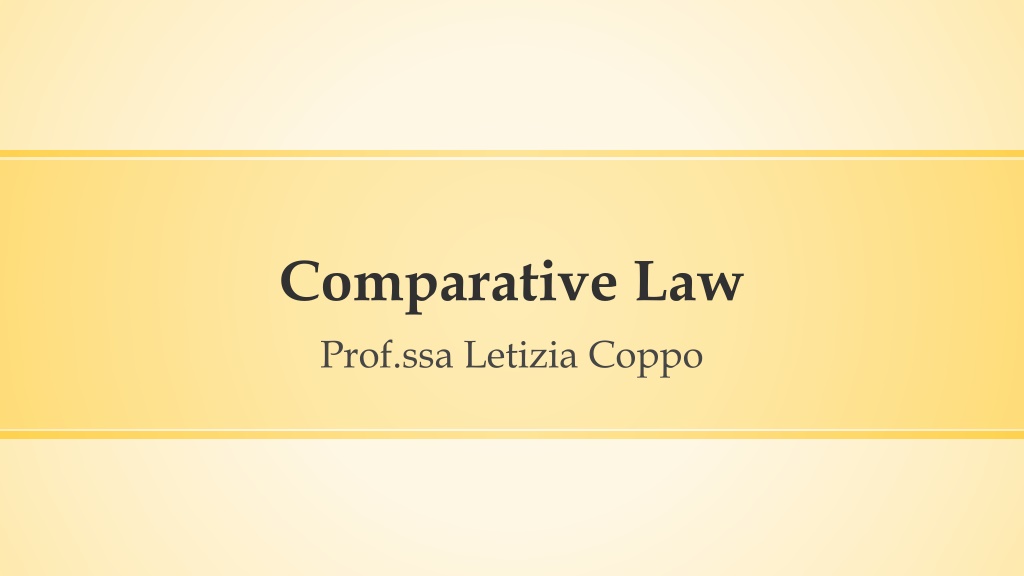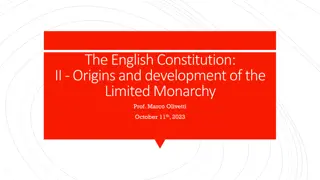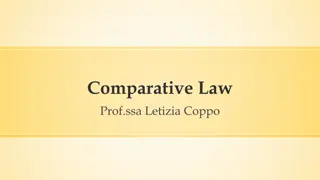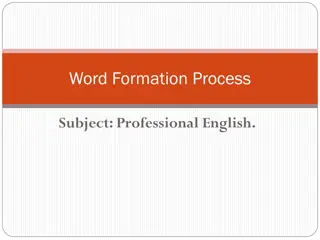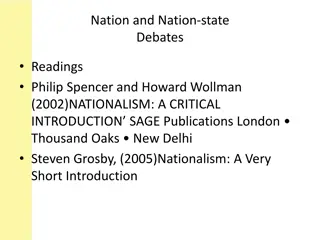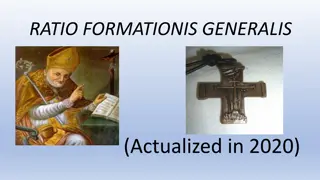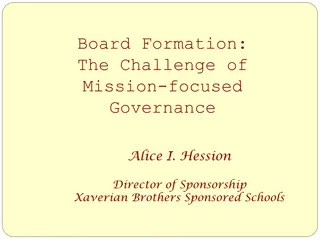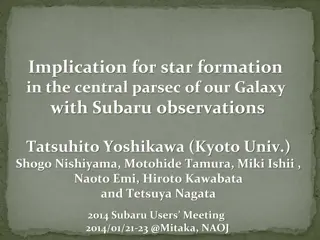Evolution of English Law: Historical Origins and Formation
The historical origins and formation of English law trace back to the Medieval period, characterized by Norman conquest, feudalism, and a strong central royal authority. The organization of the judiciary system and the development of procedural rules played pivotal roles in shaping English law. The evolution of writs and the establishment of royal courts contributed to the modernization and prestige of the legal system.
Download Presentation

Please find below an Image/Link to download the presentation.
The content on the website is provided AS IS for your information and personal use only. It may not be sold, licensed, or shared on other websites without obtaining consent from the author. Download presentation by click this link. If you encounter any issues during the download, it is possible that the publisher has removed the file from their server.
E N D
Presentation Transcript
Comparative Law Prof.ssa Letizia Coppo
THE COMMON LAW TRADITION ENGLISH LAW
HISTORICAL ORIGINS - FORMATION OF ENGLISH LAW I. The Medieval Period: Normans and Feudalism 1066 a.D. Battle of Hastings and Norman conquest of England. Construction of a well-organised feudal system, where land belong to the king and was awarded to subjects as a tenancy.
HISTORICAL ORIGINS - FORMATION OF ENGLISH LAW Political context Strong central royal authority Net of permanent administrative officers Centralised judicial system, with its own procedural rules
HISTORICAL ORIGINS - FORMATION OF ENGLISH LAW Organisation of judiciary (since 1300 up to XVII century) 1) Curia Regis or Exchequer: supreme treasury and jurisdiction for tax litigation. 2) Court of Common Pleas: jurisdiction over disputes between individuals; power to supervise lower courts run by sheriffs. 3) Court of King s Bench: matters of political significance.
HISTORICAL ORIGINS - FORMATION OF ENGLISH LAW Procedural system: procedural rules of royal courts were more modern and progressive, as based on forms of action made available by the royal administration (more authority and prestige). Local rules applied byAnglo-Saxon tribes lost significance. A formal system of claims developed, which was unconsciously close to ancient Roman trial structure.
HISTORICAL ORIGINS - FORMATION OF ENGLISH LAW The system of writs In common language they were letters from a superior, whether ecclesiastical or law, containing a message for the addressee with a request or an instruction. In legal language they were commands of the king directed to the competent officials, judges or magistrates, containing a brief description of the matter under dispute and instructing the addressee to call the defendant into court and solve the conflict before the parties.
HISTORICAL ORIGINS - FORMATION OF ENGLISH LAW Writ of right: it enabled a vassal to demand that defendant refrains from interfering with his right to possess and use a piece of land. Writ of customs and services: it enabled the landlord to claim from the vassal that he performed his services. Writ of replevin: claim that the superior releases the chattels on which he has distrained in order to exact the feudal services.
HISTORICAL ORIGINS - FORMATION OF ENGLISH LAW Main features of writs They were typical and begun to be standardised, but with a strong evolutionary potential (see writ of trespass). Each matched with certain facts and a certain claim and had its own procedural rules; a miss-match meant the denial of the claim.
HISTORICAL ORIGINS - FORMATION OF ENGLISH LAW II. The XIV century and the development of Equity The formalism of Common Law trials was excessive, so parties who lost a lawsuit in the King s Courts or could not obtain a writ, started addressing their petitions to the King in person. Gradually, such petitions were committed to the King s Chancellor, a churchman: his decisions developed into what is known as Equity
HISTORICAL ORIGINS - FORMATION OF ENGLISH LAW II. The XIV century and the development of Equity Common law and Equity start being separate and potentially conflicting concepts, though they are not perceived by English jurists as antithetical. They were more perceived one (common law) as the text, or the code, the other as the supplement.
HISTORICAL ORIGINS - FORMATION OF ENGLISH LAW Legal heritage of Equity Development of Trust doctrine Development of Remedies like specific performance, proprietary estoppel and injunction.
HISTORICAL ORIGINS - FORMATION OF ENGLISH LAW III. The XVI century (the Tudors and Stuarts) Time of great conflict between the King and the Parliament; strong appeal of Roman law among the royalists. Establishment of the Star Chamber, a royal court dealing with political crimes. The Court s procedure was based on Roman and canon law.
HISTORICAL ORIGINS - FORMATION OF ENGLISH LAW The judges sitting in the Star Chamber had been educated in Civil law at the English universities and formed a special guild in Doctor Commons since 1511. Also intellectual climate was favourable to Roman law, being influenced by the Renaissance which was taking place in Italy. Common law, instead, was the Parliament s weapon; a guarantee of freedom against the interference of absolute authority.
HISTORICAL ORIGINS - FORMATION OF ENGLISH LAW IV. The XVII century and the Age of Settlement Victory of the Parliament over the King and period of peace; development of trade. Eminent figures of judges and lawyers (Bracton, Coke, Mansfield). Blackstone s Commentaries on the Laws of England: first to order and control the magmatic English case-law.
HISTORICAL ORIGINS - FORMATION OF ENGLISH LAW V. The Age of Reform (XIX century; after Waterloo) Development of trade, migration to the cities, drop of wages and unemployment, strikes. Series of political and social reforms. Jeremy Bentham and the Utilitarian school, which scrutinized the traditional institutions of society to determine whether they were appropriate and useful to the central aim of social order.
HISTORICAL ORIGINS - FORMATION OF ENGLISH LAW Bentham thought that common law rules, often based on historical accident, rather than rational design, hindered major social reforms. He advocated a deep reform of the system, which he thought should be reached only through comprehensive codification. Codification was never undertaken, but several special statutes were enacted to simplify the system.
HISTORICAL ORIGINS - FORMATION OF ENGLISH LAW Judicature Act (1873): simplification and unification of the court system and of procedural rules. No more separate courts for common law and equity (but still, matters of equity are normally dealt with by the chancery division; and equity principles shall prevail on conflicting common law rules). Abolition of the system of writs: only one way to file an application, ie the writ of summons.
HISTORICAL ORIGINS - FORMATION OF ENGLISH LAW The development of the legal profession Establishment of guilts of jurists within the king s entourage. Legal profession as a sect thanks to the inns: life in common and professional solidarity. Co-optation of lawyers by judges and distinction between attorneys and barristers.
HISTORICAL ORIGINS - FORMATION OF ENGLISH LAW Establishment of guilts of jurists within the king s entourage. Legal profession as a sect thanks to the inns. Co-optation of lawyers by judges and distinction between solicitors and barristers, two categories of legal professionals who still play different roles in the system.
THE LEGAL PROFESSION IN ENGLAND I. Barristers They are members of the Bar Council of England and Wales and have rights of audience in court. They are governed by the Bar Standards Board. Every barrister also has to be a member of an Inn of Court (Inner Temple, Lincoln's Inn, Middle Temple and Grays Inn).
THE LEGAL PROFESSION IN ENGLAND I. Barristers Barristers are generally classed as being self employed in that they operate in sets of 'chambers' but are not employed by a law firm as such. There is a Bar Directory which lists all known barristers by name and you can also search for sets of chambers.
THE LEGAL PROFESSION IN ENGLAND II. Solicitors Solicitors are members of the Law Society. The regulation of solicitors is done by an independent body called the Solicitors RegulatoryAuthority (SRA). Solicitors do not generally have rights of audience in court but there are some exceptions.
THE LEGAL PROFESSION IN ENGLAND II. Solicitors They generally do the legal research and can represent their clients in legal negotiations but then pass the case over to a barrister if it is necessary to take action in court. Clients hardly ever directly employ a barrister; they are more likely to have contacts only with solicitors.
THE LEGAL PROFESSION IN ENGLAND III. Judiciary There are lots of different types of judges sitting within England and Wales, all in different courts and tribunals and with different roles and powers. There are 3 main jurisdictions civil, criminal and family and in these sections there are judges, magistrates and those that sit on tribunals.
THE LEGAL PROFESSION IN ENGLAND Judges sit in different courts depending on seniority. After the changes in 2006 the Lord Chief Justice is responsible for deciding where judges sit and what cases they hear. There is also a Judicial Executive Board to help govern and direct and this includes the Lord Chief Justice, Master of the Rolls, President of the Queen s Bench Division, President of the Family Division, Chancellor of the High Court, and two Lords Justices.
OVERVIEW OF LEGAL EDUCATION IN ENGLAND The first step to become a solicitor or a barrister is a qualifying undergraduate law course (usually over 3 or 4 years). To be a barrister you then need to complete a Bar Professional Training Course and can then go on to apply for pupilage (where you are effectively a trainee barrister). To become a solicitor then on top of the undergraduate course you will then need to go on and complete the Legal Practice Course before applying to law firms to get a 'training contract'.
OVERVIEW OF LEGAL EDUCATION IN ENGLAND Carrier in the judiciary Judges are appointed by the Judicial Appointments Commission (JAC), ie an independent commission that recommends candidates for judicial office in the courts and tribunals of England and Wales. Most judicial posts will require a relevant legal qualification that has been held for either five or seven years.
